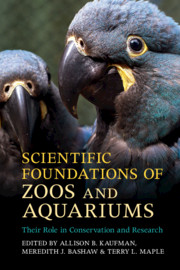Book contents
- Scientific Foundations of Zoos and Aquariums
- Scientific Foundations of Zoos and Aquariums
- Copyright page
- In Memoriam
- Epigraph
- Contents
- Contributors
- Acknowledgments
- Introduction
- Part I Programs and Initiatives
- Part II Captive Care and Management
- Part III Saving Species
- Part IV Basic Research
- 17 “Largest Breeding Colony Outside of Australia”
- 18 Comparative Cognition Research in Zoos
- 19 Learning about Dolphins
- 20 Contributions of Zoo-Based Reproductive Research to Marine Animal Conservation
- 21 Studying Play in Zoos and Aquariums
- 22 Krogh’s Principle and Why the Modern Zoo Is Important to Academic Research
- 23 Does Research Have a Place in the Zoological Garden?
- Conclusion
- Appendix
- Index
- References
17 - “Largest Breeding Colony Outside of Australia”
Linking Koala Ex Situ and In Situ Research
from Part IV - Basic Research
Published online by Cambridge University Press: 21 December 2018
- Scientific Foundations of Zoos and Aquariums
- Scientific Foundations of Zoos and Aquariums
- Copyright page
- In Memoriam
- Epigraph
- Contents
- Contributors
- Acknowledgments
- Introduction
- Part I Programs and Initiatives
- Part II Captive Care and Management
- Part III Saving Species
- Part IV Basic Research
- 17 “Largest Breeding Colony Outside of Australia”
- 18 Comparative Cognition Research in Zoos
- 19 Learning about Dolphins
- 20 Contributions of Zoo-Based Reproductive Research to Marine Animal Conservation
- 21 Studying Play in Zoos and Aquariums
- 22 Krogh’s Principle and Why the Modern Zoo Is Important to Academic Research
- 23 Does Research Have a Place in the Zoological Garden?
- Conclusion
- Appendix
- Index
- References
Summary
- Type
- Chapter
- Information
- Scientific Foundations of Zoos and AquariumsTheir Role in Conservation and Research, pp. 477 - 489Publisher: Cambridge University PressPrint publication year: 2019

